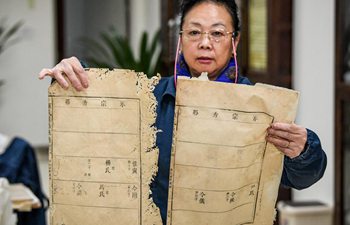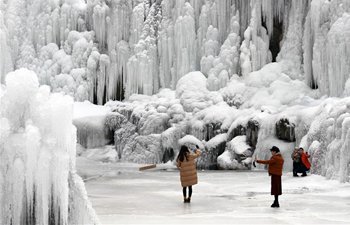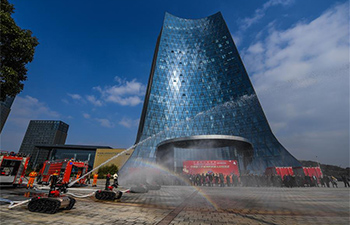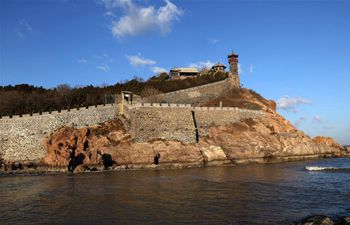
Photo taken on Dec. 22, 2017 shows theUnited Nations Security Council voting on a resolution on the Democratic People's Republic of Korea (DPRK) at the UN headquarters in New York. The United Nations Security Council on Friday adopted a resolution to tighten sanctions against the DPRK. (Xinhua/Wang Ying)
UNITED NATIONS, Dec. 22 (Xinhua) -- The Security Council on Friday adopted a new resolution to further tighten sanctions against the Democratic People's Republic of Korea (DPRK) in response to its ballistic missile launch late last month.
Resolution 2397, which passed the 15-member council unanimously, bans nearly 90 percent of refined petroleum product exports to the DPRK, by setting a ceiling of 500,000 barrels during a period of 12 months beginning Jan. 1, 2018. It provides for the same amount in 12-month periods thereafter with conditions.
It also caps crude oil exports to the DPRK at the current level of 4 million barrels a year.
As an important measure to cut the source of funding for Pyongyang's nuclear weapon and ballistic missile programs, the resolution requires UN member states to repatriate all DPRK nationals earning income abroad immediately, but no later than 24 months from the date of adoption of this resolution.
In addition, the resolution bans DPRK exports of food and agricultural products; machinery; electrical equipment; earth and stone, including magnesite and magnesia; wood and vessels.
It bans the supply of industrial machinery, transportation vehicles, and iron, steel, and other metals to the DPRK.
The resolution provides for measures to stop ships from illegally providing oil to the DPRK through ship-to-ship transfers and smuggling DPRK coal and other prohibited commodities by sea.
Member states may seize, inspect, freeze (impound) any vessel in their territorial waters, should they have reasonable grounds to believe that the vessel was involved in activities, or the transport of items, prohibited by Security Council resolutions, reads the text.
The resolution puts 19 new DPRK individuals, most of them DPRK overseas bank representatives, and the Ministry of the People's Armed Forces, which manages the general administrative and logistical needs of the Korean People's Army, on a list for a global asset freeze and travel ban.
The resolution reiterates the importance of maintaining peace and stability on the Korean Peninsula and in Northeast Asia at large, and expresses its commitment to a peaceful, diplomatic, and political solution to the situation.
It welcomes efforts by the council members as well as other states to facilitate a peaceful and comprehensive solution through dialogue, and stresses the importance of working to reduce tensions on the Korean Peninsula and beyond.
The resolution reaffirms support for the Six Party Talks involving the DPRK and the Republic of Korea, China, Japan, Russia and the United States, and calls for their resumption.
UN Secretary-General Antonio Guterres welcomed the unanimous adoption of the resolution.
"The secretary-general welcomes the continued unity of the Security Council, which is essential to achieve the goal of de-nuclearization and create the space for diplomatic initiatives aimed at achieving it in a peaceful manner," said Guterres' spokesman Stephane Dujarric in a statement.
The secretary-general supports the Security Council's desire for a peaceful, diplomatic and political solution to the situation, as well as its call for further work to reduce tensions, said the statement. He reaffirmed his commitment to working with all parties to that end.
The secretary-general called on all UN member states to ensure the full implementation of the relevant Security Council resolutions and to redouble efforts to make 2018 a pivotal year for the achievement of sustainable peace on the Korean Peninsula.
"The only way forward for a comprehensive peaceful and political solution requires de-escalation and open communication channels, now," said the statement.
Francois Delattre, the French ambassador to the United Nations, said maximum pressure on the DPRK is the best lever of the international community that would lead to dialogue, which then will lead to a political settlement.
"The great determination we are expressing today is our best antidote to the risk of war and the best opportunity we have to open the way to dialogue and to a political solution that we are all seeking," he told the council after the vote.
Irina Schoulgin Nyoni, Sweden's deputy permanent representative to the United Nations, said sanctions alone will not solve the situation. "Creative efforts that pay the way for a political solution must be pursued."
She cautioned that there is no military solution to the situation on the Korean Peninsula. "We need to ensure that in a search for a comprehensive settlement, every avenue for peace is explored and exhausted."
Wu Haitao, charge d'affaires of China's permanent mission to the United Nations, said Friday's resolution reflects the unanimous position of the international community in opposing the DPRK's development of nuclear weapon and ballistic missile capabilities and in maintaining the international non-proliferation regime.
China urges the DPRK to take seriously the demands of the international community and refrain from any further nuclear and missile tests, he said.
The resolution also stresses that the nuclear issue on the Korean Peninsula should be solved peacefully, through political and diplomatic means. There are also provisions in the resolution that the restrictive measures are not intended to hurt normal economic activities and cooperation and food and humanitarian assistance, he noted, calling for full and comprehensive implementation of the resolution.
He stressed that the issue can only be solved through dialogue and negotiations. "It is imperative to put an immediate end to rhetoric and actions that are detrimental to de-nuclearization and peace and stability on the peninsula," he said.
The dangerous situation that carries the risk of spiraling out of control is not in the interests of any country, said Wu.
Resolution 2397 is the 10th Security Council resolution that contains sanctions against the DPRK since 2006, when it carried out its first ever nuclear weapon test. It is the third resolution that contains sanctions in 2017 alone.















